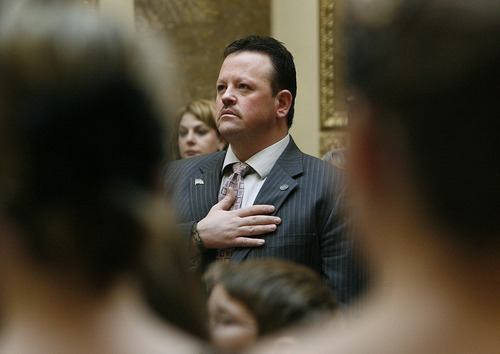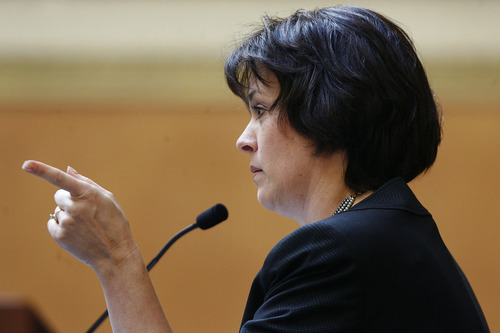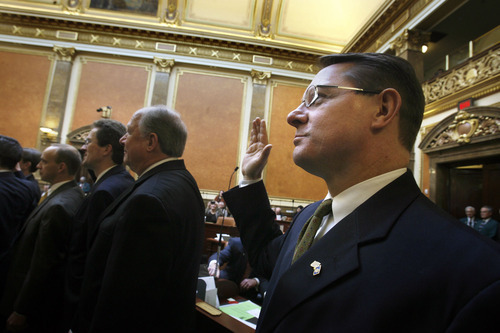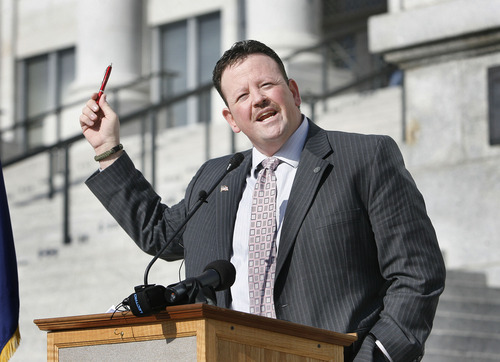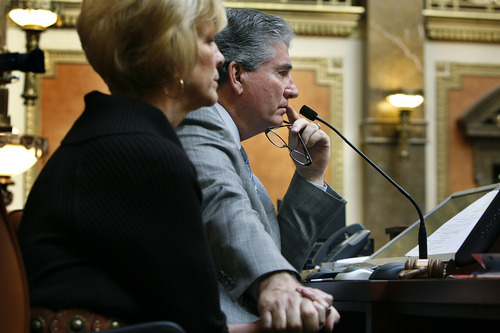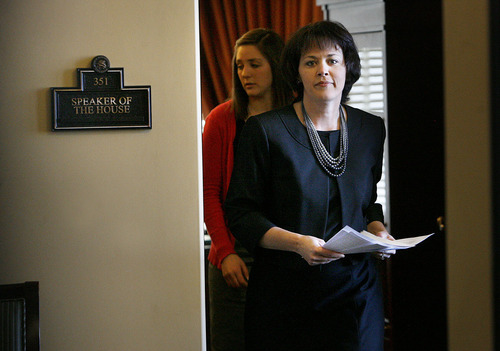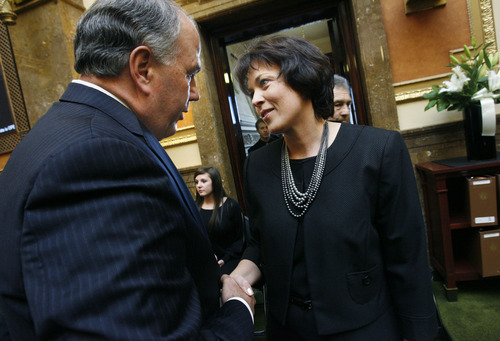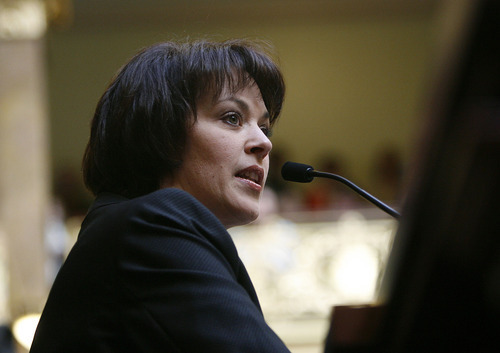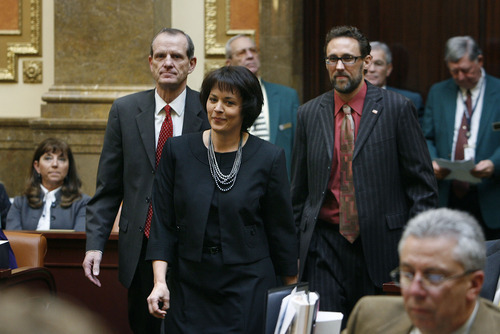This is an archived article that was published on sltrib.com in 2011, and information in the article may be outdated. It is provided only for personal research purposes and may not be reprinted.
The 2011 Utah Legislature opened Monday with a new look, with a woman at the helm of the House for the first time in history and a more conservative membership than in recent years.
By the end of the 45-day session, the overwhelmingly Republican lawmakers hope to have cracked down on illegal immigration, reformed the education system, battled back against perceived federal encroachment and balanced a state budget regaining its footing after the prolonged economic downturn.
"As a state, we face real challenges. We must address those challenges head-on," House Speaker Rebecca Lockhart, R-Provo, said Monday after being sworn in. "Over the next seven weeks we will debate immigration reform and health care reform. We will address an economy that needs less government, not more."
Lockhart upset former Speaker David Clark by a single vote in November and Clark administered the oath of office to Lockhart on Monday morning. She is one of just three female House speakers serving in the United States.
In her opening remarks, Lockhart, who had downplayed the significance of her becoming speaker, recounted the story of Utahn Martha Hughes Cannon, whom she called a "firebrand" who worked her way through medical school, then ran against her husband in 1896 to be the first woman in the nation elected to a state Senate seat.
"Martha Cannon may not have recognized the significance of her influence, but surely we recognize it now: She was a leader," Lockhart said.
She has promised more open, lively debate, driven by the representatives, which could make for a raucous session, but in her opening remarks she encouraged a civil tone and responsiveness to constituents.
Across the Capitol, Sen. Michael Waddoups, R-Taylorsville, was re-elected as Senate president. Waddoups has pushed hard to squeeze state government, challenging an array of programs.
"Each of us have been elected to be servants; let us serve for the right reasons this year," Waddoups said. He noted that while many states face bleak budget and employment situations, Utah has been named the best-managed state in the nation. "We must live within our means, we will balance the budget."
For the first time in years, Utah is projecting budget growth, but not nearly enough to pay for the hundreds of millions of dollars in demands, including Medicaid growth, retirement increases and funding for an estimated 14,700 new students expected to enroll in public schools in the fall.
Legislators already have targeted dozens of cuts in an effort to slash government to a sustainable level. Gov. Gary Herbert has proposed fewer cuts and using more of the state's Rainy Day Funds — essentially the state's savings account. Both agree that tax increases should be off the table.
Republicans possess commanding super-majorities in both chambers.
Five Republicans knocked off Democrats in the November election, and several other GOP moderates have either retired or were defeated in their party convention. That leaves Republicans with a 57-17 majority in the House (with one vacancy), the most lopsided margin since 1985.
For many of those members, resisting what they see as an onerous federal government will be a top priority and common theme throughout the session.
"There are fundamental principles upon which this country was founded: federalism and state sovereignty," Lockhart said. "Are there instances where the federal government intrudes on our state government? Is Utah willing to tell the federal government to go away when it oversteps its authority? … I believe together we can find answers to these questions."
Rep. Carl Wimmer, R-Herriman, a co-founder of the state's rights-focused Patrick Henry Caucus, said his group will focus on maintaining access to public lands, resisting federal health reform and opposing government regulations on agricultural products.
In the Senate, Democrats lost one seat and now hold just seven spots in the 29-member body.
Democrats say they will be pushing for "common sense solutions" to budget issues that would avoid harming public education, higher education and health and human services.
"It can't just be the conversation starts and ends with cuts," said the new Senate Minority Leader Ross Romero, D-Salt Lake City. He said the discussion should at least include other revenue sources, like an increase to the gas tax, the severance tax or reversal of tax breaks given to businesses that file their taxes monthly.
Romero said more bonding for roads — instead of paying for them with cash — would also free up money for Utah's education needs.
In perhaps some foreshadowing of the contentious issues to come, some 150 to 200 activists rallied Monday afternoon on the steps of the Capitol, opposing tough legislation modeled after an Arizona law aiming to crack down on illegal immigration. The protesters carried signs and chanted "What do we want? Amnesty! When do we want it? Now!"
Another group of about 100 supporters of gay and lesbian rights gathered later in the evening to rally for statewide protections against discrimination based on an individual's gender identity. —
Legislature roster and more
For a pdf of a guide to the Utah Legislature, go to http://bit.ly/gfQpqR


